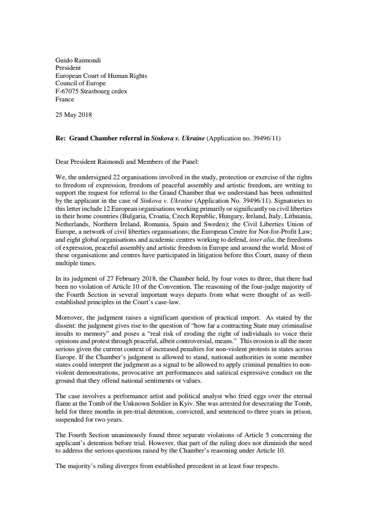Bubon v. Russia
Transparency of Crime Statistics
A legal researcher was writing an article on prostitution and policing in the Khabarovsk region of Russia, and requested statistics on sexual exploitation crimes from the police. His request was denied on the basis that only senior government officials could have access to the data. He took his case to the European Court of Human Rights. The Justice Initiative argued that the right of access to information included crime statistics. While the Court accepted that such statistics could be requested, it concluded that the right to information does not impose an obligation to collect information upon the request of an individual, particularly when a considerable amount of work is involved.
Facts
Konstantin Bubon is a legal researcher who regularly publishes articles in a number of Russian law journals and magazines. In May 2009, while researching the issue of prostitution in the Khabarovsk region, Bubon asked local police authorities for statistics regarding the prosecution of sexual exploitation offenses during a specified nine-year period. In a written request to the head of the police department, Bubon noted that he sought only general data as part of empirical research for an assigned article.
In June 2009, after receiving no response from the police, Bubon filed a claim in the district court. He complained that the police authorities’ failure to provide the statistical data was unlawful, as he had not requested access to state secrets or otherwise confidential information. Bubon relied on a Russian statute giving citizens the right to request from state authorities “information on their activities” without needing to further explain the request or prove a personal interest in obtaining the information (so long as the requested data does not constitute a state secret).
In July 2009, the police department formally denied Bubon’s request, arguing that it could only provide crime statistics to senior government officials. The police claimed that individuals and legal entities were not permitted to access to such data. Bubon then filed an unsuccessful inquiry with the Federal Service of State Statistics, which responded that authorities from the Khabarovsk region had not submitted any relevant crime statistics. As a result, the police department remained in exclusive possession of the requested information.
The domestic courts ultimately ruled against Bubon, finding that the police department’s denial of information did not affect the applicant’s personal interests—despite his claim that there was no such requirement under either Russian law or Article 10 of the European Convention.
Open Society Justice Initiative Involvement
In November 2010, the Open Society Justice Initiative submitted third-party comments on the case to the European Court of Human Rights. Information on certain comparative laws and practices discussed in the brief was collected with pro bono assistance from the US-based law firm Ropes & Gray, the Canadian Media Lawyers Association, and the Hungarian Civil Liberties Union.
Arguments
Status of right to know. Access to information is widely acknowledged by regional and domestic legal systems.
No personal interest required. Requiring information requesters to prove a personal interest in the information is not consistent with the jurisprudence of the European Court or comparative law.
Access to crime statistics. Many democratic countries in Europe and elsewhere publish and disseminate detailed statistical information concerning crime, either proactively or upon request.
In a judgment delivered on 2 February 2017, the European Court concluded that there was no violation of the Convention. The government had claimed that it was not possible to provide the data breakdown the applicant wanted without substantial effort. The Court accepted the government’s view of the facts, and concluded that Article 10 “does not impose an obligation to collect information upon the applicant’s request, particularly when, as in the present case, a considerable amount of work is involved.”
The European Court of Human Rights issues judgment in the case.
The Justice Initiative submits third-party comments on the case.
The case is communicated to the Russian government.
Applicant files petition with the European Court of Human Rights.
The Khabarovsk Regional Court upholds the judgment of the lower court.
The Tsentralniy District Court of Khabarovsk dismisses the applicant’s claim.
The Information center of the Police Department denies access to the information.
The applicant lodges a claim with the Tsentralniy District Court of Khabarovsk.
The applicant files a freedom of information request with the Khabarovsk Regional Police Department.
Related Cases
HCLU v. Hungary
In this case involving a Hungarian NGO denied access to information, the European Court of Human Rights ruled that the denial interferes with the group's right to information.
Claude Reyes v. Chile
The Inter-American Court of Human Rights is the first international tribunal to recognize a basic right of access to government information as an element of the right to freedom of expression.
Related Work
Joint Letter: Support for ECHR Grand Chamber Referral in Sinkova v. Ukraine
A joint letter from 22 organizations supporting freedom of expression, sent to support a Grand Chamber review of the ECHR’s Sinkova v. Ukraine ruling.

A Legal Victory in the Drive to End Racist Police Tactics Ethnic Profiling
Mohamad Wa Baile, a Swiss citizen, complained to the European Court of Human Rights that he had been subjected to a discriminatory stop by police in Switzerland. The court ruled in his favor, marking a step forward in the drive to eliminate racially-biased policing in Europe.

European Court of Human Rights Condemns Racist Policing
The European Court of Human Rights has found that police in the Swiss city of Zurich engaged in ethnic profiling, in an identity check stop carried out on Mohamed Wa Baile, a Swiss citizen, at the city’s’ train station in 2015.